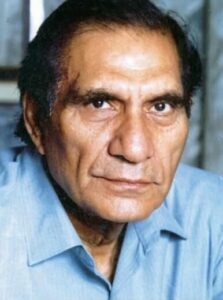Introduction: The Unforgettable Maestro of Hindi Cinema
 In the vibrant arena of Hindi Cinema, one name that echoes with unparalleled reverence is: Mohammed Rafi. A conversation about Hindi Cinema Music feels incomplete without acknowledging the legacy of this musical maestro. Even today, the melodic tapestries woven by Mohammed Rafi resonate in the hearts and souls of millions of fans globally, transcending time and space.
In the vibrant arena of Hindi Cinema, one name that echoes with unparalleled reverence is: Mohammed Rafi. A conversation about Hindi Cinema Music feels incomplete without acknowledging the legacy of this musical maestro. Even today, the melodic tapestries woven by Mohammed Rafi resonate in the hearts and souls of millions of fans globally, transcending time and space.
Rafi Sahab, as he is affectionately known, is revered not just for his extraordinary vocal talent but also for his out-of-this-world simplicity, humility, invisible charity, and unwavering devotion to his craft. Fans consider him a demi-God, a figure untouched by greed or controversies, creating a legacy that transcends time.
However, even divine figures like Mohammed Rafi found themselves entangled in unwanted controversies. One such incident dates back to August 15, 1954, when the celebrated filmmaker B.R. Chopra released ‘Naya Daur,’ starring icons like Dilip Kumar, Vyjayanthimala, Ajit, Jeevan, and Johnny Walker. The movie was a cinematic masterpiece complemented by the soul-stirring compositions of O.P. Nayyar, most of which were sung by Mohammed Rafi.
The Exclusive Contract Dispute: Rafi’s Principled Stand
As the accolades poured in, the influential filmmaker B.R. Chopra, the magician behind Naya Daur, envisioned securing the entire team under an exclusive contract. This contract would prevent the Actors, Music Director, and Singers from collaborating with other film production houses. However, when Mohammed Rafi was presented with this exclusive contract, he gracefully declined, asserting that his voice belonged to the masses and should not be confined.
This principled stand irked the legendary filmmaker, leading him to declare that he would not only cease collaboration with Mohammed Rafi but also go on to ‘create’ a new Rafi through his films. Later, Chopra claimed that many other producers and directors were following suit, neglecting Rafi for their projects.
Resilience Amidst Setbacks: Rafi’s Unwavering Focus
Despite facing a decline in recording opportunities, Mohammed Rafi remained composed and focused on delivering quality singing. His dedication turned the tide, and filmmakers gradually started to ignore B.R. Chopra’s advisory, returning to Rafi Sahab for their musical needs. This period showcased Rafi’s unwavering commitment to his art, rather than bowing to commercial pressures or exclusive demands.
The “Waqt” Redemption: A Silent Triumph
In another turn of events, the mid-sixties saw B.R. Chopra’s younger brother, Yash Chopra, seeking his advice for an important song in his upcoming film, ‘Waqt.’ Understanding the significance of the song, B.R. Chopra gave his approval to have the song recorded by Mohammed Rafi.
On July 30, 1965, with the release of ‘Waqt,’ the song, ‘Waqt Se Din Aur Raat…’ became a roaring success, serving as a silent response to B.R. Chopra’s earlier claims. This iconic track not only reinforced Rafi’s unparalleled talent but also symbolized his triumph through integrity.
In this silent triumph, Rafi Sahab not only left an indelible mark but also imparted a crucial life lesson to his fans: “Aadmi Ko Chahiye Waqt Se Dar Kar Rahe” (A person should fear time and act accordingly). The episode showcased Rafi’s resilience, reinforcing his status as an eternal icon in the world of Hindi Cinema Music.
Conclusion: Rafi’s Enduring Legacy of Talent and Integrity
In conclusion, Mohammed Rafi’s journey through controversies exemplifies not just his musical prowess but also his unwavering commitment to his principles. His legacy lives on, an enduring testament to the power of talent, integrity, and the timeless voice that transcends all challenges. This episode from his life reinforces why he is cherished as a true legend by the Rafi Fan Club and millions worldwide.
~ Prashant Karve (Ambernath)
